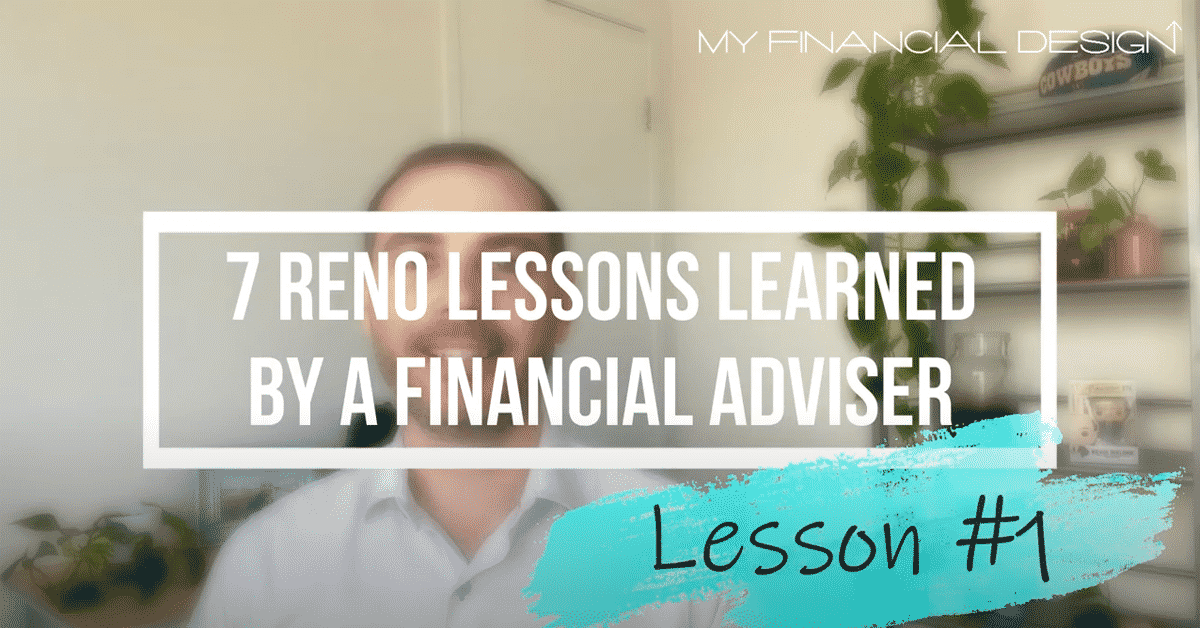Brisbane Financial Adviser, Luke Hanson of My Financial Design, shares lessons learned renovating his investment property. Today is part 1 of the series. . . . Hello, welcome to the series 7 Renovation Lessons Learned by a Financial Adviser and I’m that financial adviser, Luke Hanson, Director at My Financial Design.
Lesson number one, get a game plan. It’s so important in the early stages of planning for a renovation, whether it be on your principal place of residence or an investment property, to start with a game plan for me, it was making sure I was identifying what’s the actual purpose of the renovation. If that’s your principal place of residence, it might be to make it more comfortable, more modern and something you enjoy a little bit more. It could be to add value. You might be planning to sell it in the future, and you want to make sure you lock in some value here so that you can get a better sale price. It could be if it’s an investment property to make it more attractive to a potential tenant. So I like to start with the end in mind. So with the game plan, start by identifying what it is that you’re needing to do with this renovation. And what’s its purpose. I also like to ask for input from others along the way. So perhaps if it’s your own home and you know, the 6-12 months before you actually start the renovation, you’re thinking about it, you’re getting ideas, you kind of know what the purpose is, but you want to fine tune some of that. Obviously you want it to be your idea, your own creativity and making sure you’re the one making the decisions, but it’s so good to get input from other people along the way. By that I mean, you might have a friend over for a barbeque or over for dinner one night and say, Hey, I’m thinking about making some changes to my kitchen and this is the layout. I’m thinking this is the design or the color scheme or whatever it is you’d like to get input on and just run that by other people and see what their response is. You never know what experience other people have, perhaps they’ve renovated or been involved in the building process themselves. But I always put it out there. Look, some people, you know, don’t have a lot to say. Other people have a lot of creativity and a lot of ideas, and you’re able to reshape and rethink things a little bit more. So I encourage you ask for the input of others along the way. Also in this game plan stage, I like to make sure I identify what is it that I’m going to do and what is it that I’m going to pay other people to do? This is often where the renovation process can become unstuck. You hear those horror stories of people starting a renovation themselves and having to pay a tradesman to come in to finish it off later on. So that’s not what we’re aiming for here, but if you can be clear at the game plan stage, what is it that I’m comfortable doing? Or what would I like to learn to do? And I think I can, I can actually do that or you know, identifying, yeah, what am I going to do? What am I happy to do? What, what brings me happiness? Do I want to sit back and say, Hey, I did this, or is it more of the fact that Hey I designed this and I paid someone else and it’s got a great outcome, but I don’t actually need to be the one doing it because it can be very time intensive. And particularly if you’ve got the ability to earn money yourself you know, as in outside of your standard work hours. So you’ve kind of got the option. Do I want to spend the next five Saturdays working in the house or do I want to spend the next five Saturdays, maybe earning some extra money and paying someone else to work in the house. So you’ve got a few options there and it comes down to what are you going to do? And what are you going to pay someone else to do? And then wrapping up this game plan stage. I like to get an idea of what we think the total budget’s going to be. So one of the steps later on is going to be to actually formulate the final budget, but in the game plan stage, take a, you know, jump onto Google and, and see, well, you know, the city you live in and the type of work you’re going to do, what is a rough cost for that? So obviously you’re going to need to get quotes later on and narrow down that budget. But at this game plan stage, you might want to get an idea. Well, if you’ve got a budget of $20,000 or $40,000 or $60,000, what is that going to get you in rough terms? And there’s no point planning a full on house renovation if you’ve only got $20,000 to spend, for example. So take that moment in that game plan stage to have a look research and maybe get some ballpark figures on what you think it’s all going to cost, but lesson number one, get a game plan, stay tuned for the rest of the series. And we’re going to go through some other lessons I’ve learned in the renovation process.


